Welcome back to the Tor.com eBook Club! November’s pick is Spin, the first book in a sci-fi trilogy from Robert Charles Wilson. Wilson has published, on average, a book a year since his debut in 1986—so where would you like to start?
Robert Charles Wilson is one of the most acclaimed science fiction writers in the genre today, having garnered multiple awards and award nominations over the course of the many stories and eighteen novels he’s published since A Hidden Place, his debut, in 1986. Fortunately for readers looking to explore his canon, the majority of Wilson’s work consists of standalone novels (with the exception of the Spin–Axis–Vortex trilogy) so there really isn’t an incorrect place to start outside of the last two books in that series. Although his novels are often classified as Hard Science Fiction, his strength as a storyteller is the humanity of his characters, and in particular, the humanity of those characters contrasted against those big Science Fictional ideas.
A Hidden Place was nominated for the Philip K. Dick award, showing from the very beginning of his career the Canadian-American writer had a way with story and words—so if you are a reader who prefers to make their way through an author’s oeuvre chronologically, then A Hidden Place is an excellent place to start. Wilson would finally receive the Philip K. Dick award for his novel Mysterium in 1994.
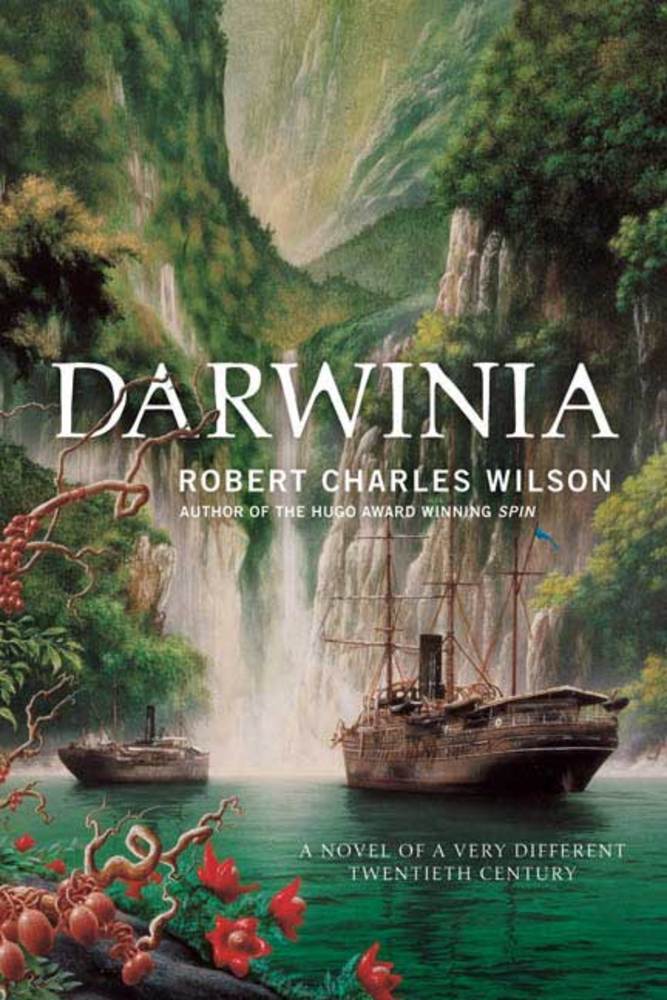 I was personally introduced to Mr. Wilson’s work with Darwinia (1998), the novel which gained him his first Hugo Nomination as well as his first Locus Nomination. This fascinating novel posits a world where an event known as the “Miracle” transforms the earth—parts of Asia and Africa, as well as Europe and all of its inhabitants simply disappear. They are replaced by an unfamiliar landscape, with strange alien fauna and flora. Here Wilson does what he does best in his fiction, allowing the reader to experience the fantastic events of his story/novel as they unfold through the eyes of his characters. He also touches upon themes in this novel that are picked up later in what is probably his landmark novel, Spin. But more on that later.
I was personally introduced to Mr. Wilson’s work with Darwinia (1998), the novel which gained him his first Hugo Nomination as well as his first Locus Nomination. This fascinating novel posits a world where an event known as the “Miracle” transforms the earth—parts of Asia and Africa, as well as Europe and all of its inhabitants simply disappear. They are replaced by an unfamiliar landscape, with strange alien fauna and flora. Here Wilson does what he does best in his fiction, allowing the reader to experience the fantastic events of his story/novel as they unfold through the eyes of his characters. He also touches upon themes in this novel that are picked up later in what is probably his landmark novel, Spin. But more on that later.
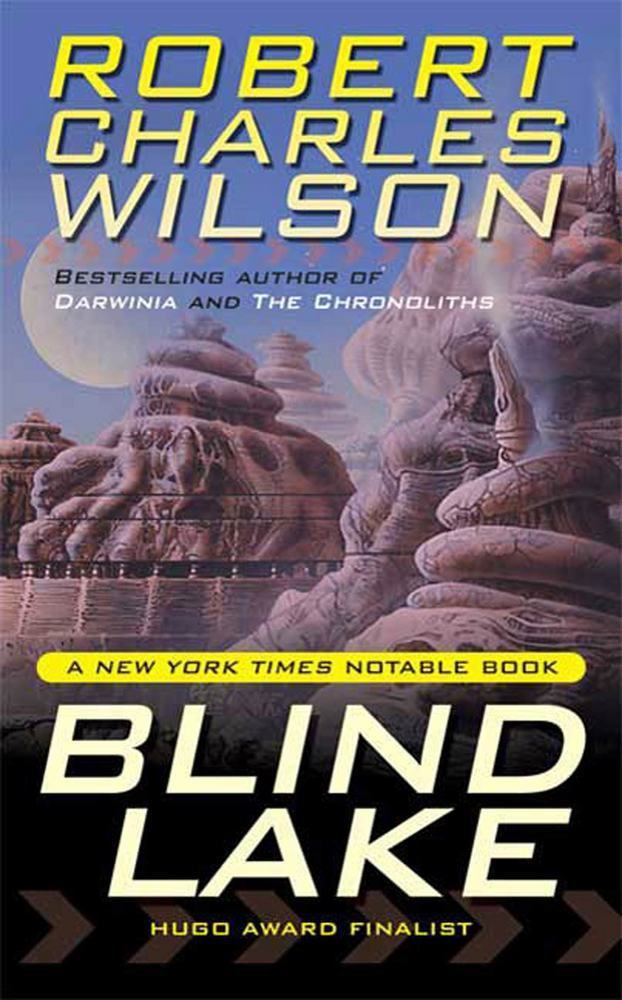 A few books later, Wilson received another Hugo Award nomination for Blind Lake (2003), which at its core is a First Contact novel, but with a bit of a twist. While an alien planet is being observed, the facility on Earth from which the aliens are being monitored goes on lockdown. More tension arises from the fact that the scientists observing the alien world, which is fifty-one light-years from Earth, aren’t told the reason behind the lockdown. The situation becomes increasingly strange, and things take a dark, almost horrific turn that demonstrates just how well Wilson can drag his characters through the spectrum of emotions.
A few books later, Wilson received another Hugo Award nomination for Blind Lake (2003), which at its core is a First Contact novel, but with a bit of a twist. While an alien planet is being observed, the facility on Earth from which the aliens are being monitored goes on lockdown. More tension arises from the fact that the scientists observing the alien world, which is fifty-one light-years from Earth, aren’t told the reason behind the lockdown. The situation becomes increasingly strange, and things take a dark, almost horrific turn that demonstrates just how well Wilson can drag his characters through the spectrum of emotions.
Wilson’s next novel was the aforementioned Spin (2005), which proves that the third time’s a charm when it comes to the Hugo nomination for best novel. Wilson received the rocket, and deservedly so because few novels in science fiction explore the human element in the face of an earth-shattering crisis as seamlessly and effortlessly. Spin provides an extremely human-focused look at a near future in which people are confronted with a technological event that far exceeds the realm of human capability.
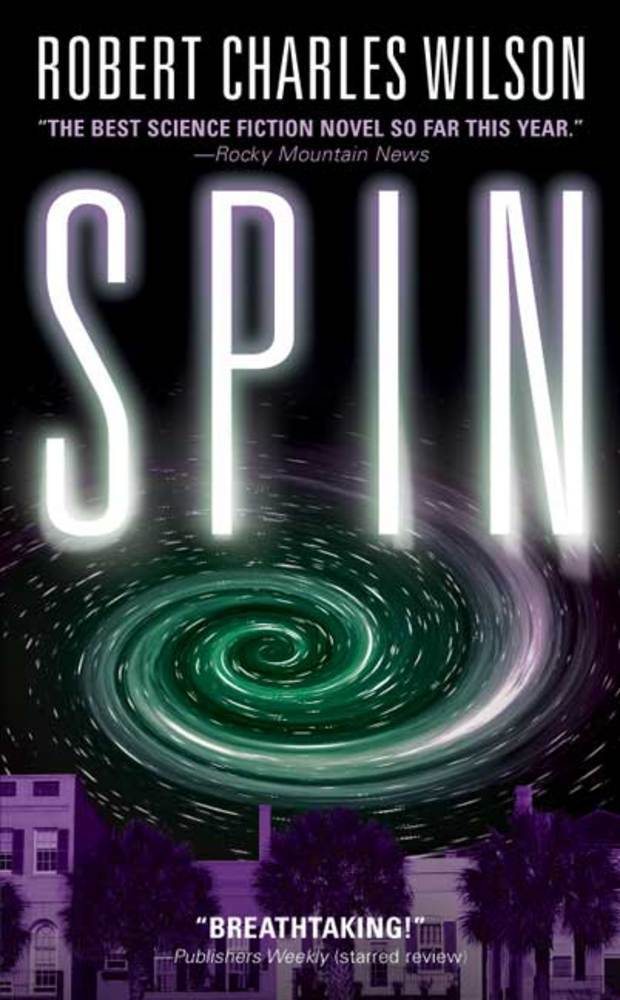 In Spin, Wilson utilized one of the great tropes of classic SF—the Big Dumb Object (or BDO); in this case, the BDO signals a global transformation not unlike the “Miracle” of Darwinia. The stars go out one night, and Wilson shows this major global event and its aftermath through the eyes of a few characters, three of whom are only about twelve years old when the story begins: Tyler, his friend Jason, and Diane, Jason’s sister and the object of Tyler’s affections.
In Spin, Wilson utilized one of the great tropes of classic SF—the Big Dumb Object (or BDO); in this case, the BDO signals a global transformation not unlike the “Miracle” of Darwinia. The stars go out one night, and Wilson shows this major global event and its aftermath through the eyes of a few characters, three of whom are only about twelve years old when the story begins: Tyler, his friend Jason, and Diane, Jason’s sister and the object of Tyler’s affections.
The aforementioned BDO is a casing, or membrane, surrounding the earth that cuts the planet off from its satellites and from the rest of the galaxy, but also affects time. For every second spent inside the casing, a little over three years passes outside the membrane—or, to go with a more harrowing calculation, one year inside the Spin Membrane equals 100 million years outside of it. Wilson follows the characters’ lives as they grow, age, and adjust to the world, which has been transformed by the aliens only referred to as the Hypotheticals. Wilson continues the story in two sequels, Axis and Vortex.
Between the publication of Axis and Vortex, though, Wilson took a slight side step away from writing Hard SF novels and turned his deft hand to crafting an American future that resembles the country during the Civil War in Julian Comstock: A Story of 22nd-Century America (2009), which was nominated for the Hugo Award. The novel is an expansion of Wilson’s novella Julian: A Christmas Story (2006).
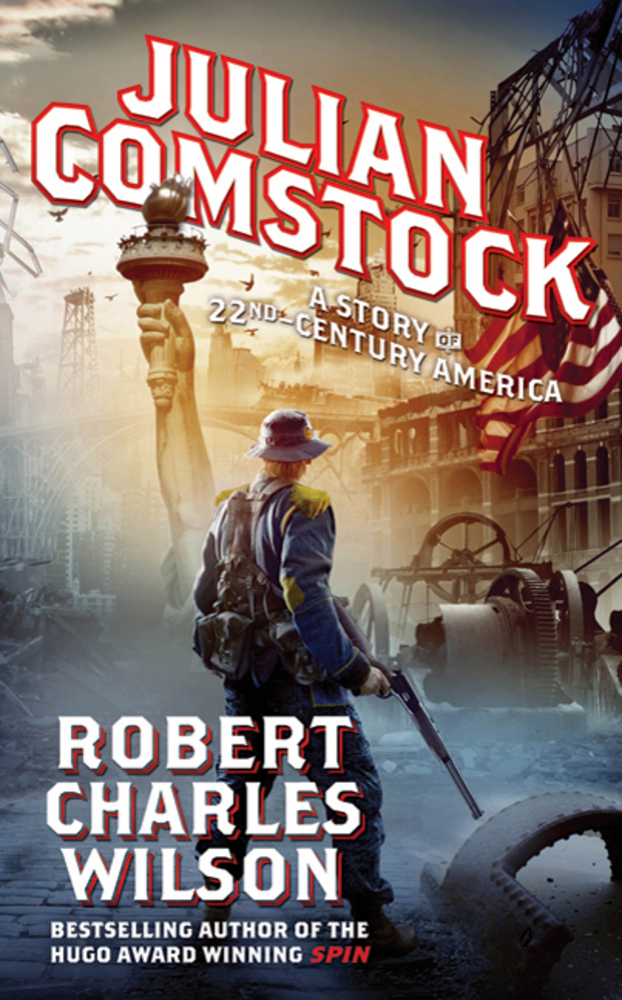 The novel is told through the eyes of Adam Hazzard, one of the titular character’s closest confidants and chronicler. While not quite a post-apocalyptic tale, the novel is definitely the story of a nation (and one suspects of a world) struggling to rise through the mire of sin and decadence left behind by its societal predecessor. The world isn’t the typically blasted landscape seen in post-apocalyptic fiction—rather, Wilson depicts a regressed vision of the future. In many ways, this is an elegiac and depressing novel, but the pathos we hear through Adam’s voice lends an understated elegance and sense of hope to the tale.
The novel is told through the eyes of Adam Hazzard, one of the titular character’s closest confidants and chronicler. While not quite a post-apocalyptic tale, the novel is definitely the story of a nation (and one suspects of a world) struggling to rise through the mire of sin and decadence left behind by its societal predecessor. The world isn’t the typically blasted landscape seen in post-apocalyptic fiction—rather, Wilson depicts a regressed vision of the future. In many ways, this is an elegiac and depressing novel, but the pathos we hear through Adam’s voice lends an understated elegance and sense of hope to the tale.
The world of Julian Comstock reached its current state after Peak oil (the point in time when the maximum rate of global petroleum extraction was reached), and the resultant global conflicts have allowed the United States of America to expand into Canada and grow to 60 states.
The reader learns about the world at large not through obtrusive info dumps, but through the story’s details, like the fact that technology such as cars and travel to the moon are viewed as nearly magical legends of the past, fallacies, or fantasy. Wilson also manages to conjure the reality of this future world and convincingly layer the details through his characters’ thoughts, actions, and words. Furthermore, by simply touching on some of the details, rather than explaining in too precise detail, Wilson lends a credibility to 22nd Century America that resonates deeply with the reader.
The novels I’ve mentioned above represent just a fraction of Wilson’s work, obviously, but in each of these books, the humanity of his characters shines through above all. Since Spin is November’s Tor.com eBook Club pick of the month, it’s definitely a good option for new readers looking for a place to start with this modern master’s work. I am also quite partial to Julian Comstock, too, since it such an absorbing, haunting read. Regardless of where you start with Robert Charles Wilson, however, chances are you’ll want to continue your exploration of his fictional worlds and characters.
If that’s the case, some standout novels not mentioned above include Memory Wire (1987), Gypsies (1988), The Divide (1990), A Bridge of Years (1991), Bios (1999), The Chronoliths (2001, winner of the John W. Campbell Memorial Award), Burning Paradise (2013), The Affinities (2015), and the forthcoming Last Year (2016) as well as his short story collection The Perseids and Other Stories (2001).
Rob Bedford lives in NJ with his wife and dog. He reviews books and moderates forums at SFFWorld, has a blog about stuff, and wrote for the sadly closed SF Signal as well as here at Tor.com. If you want to read random thoughts about books, TV, his dog, and beer you can follow him on Twitter: @RobHBedford.










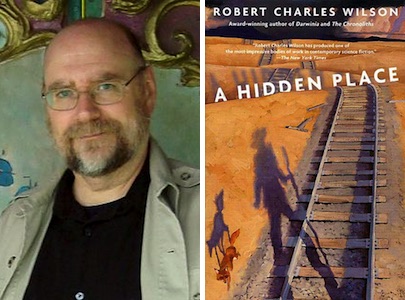
Can’t go wrong with Wilson. I am especially fond of The Chronoliths.
The Chronoliths (2001, winner of the John W. Campbell Memorial Award) is very good.
I enjoyed Blind Lake, but now I can’t recall the details. However I do recall the thought that The Chronoliths, Blink Lake, and Axis shared a common theme of people reacting to the impact of a big dumb object.
Wilson is a fantastic writer. Aside from the very unique plot details which carry his stories forward, the best feature of his work is his characterization. His protagonists seem like real people. They aren’t heroes or larger than life, but are often just people who are trying to get by. In a way it reminds me of the characters that inhabit the works of Philp K. Dick. Even when the situations are “strange”, as they often are in SF works, Wilson’s characters come off as real, “regular” people.
I know that for me, Chronoliths is the book that made me excited about reading his work. Spin has done nothing to disappoint. Hurray! More books to buy.
I also agree with the great characterization, humanity, and shear enjoyment. Blind Lake, Bios, and Spin series made me a fan for life
I’ve found a number of his works are better on the second read. That was what I felt about The Chronoliths and Blind Lake in particular.
I recently read The Harvest, which was kind cool but still had the hallmarks of being an “early work”… I have a feeling that if he wrote it today, he could have really nailed it and made another unforgettable epic. And while not at the level of Spin, I thought his 2013 “Burning Paradise” was quite well done and underrated.
I personally hated Julian Comstock, though. I’m not a big fan of “period” pieces in general, and the book read, to me, like he wanted to do a Civil War story but, as a SF writer it would mean abandoning his audience, so he made a quick explanation for why the future technology had devolved back to that level. And the narration was full of moments where I thought the author was saying, “See? Isn’t it cute? The narrator doesn’t have a clue what’s going on here, but, you and I, we do!”
The Harvest wasn’t mentioned and that is one superb novel!